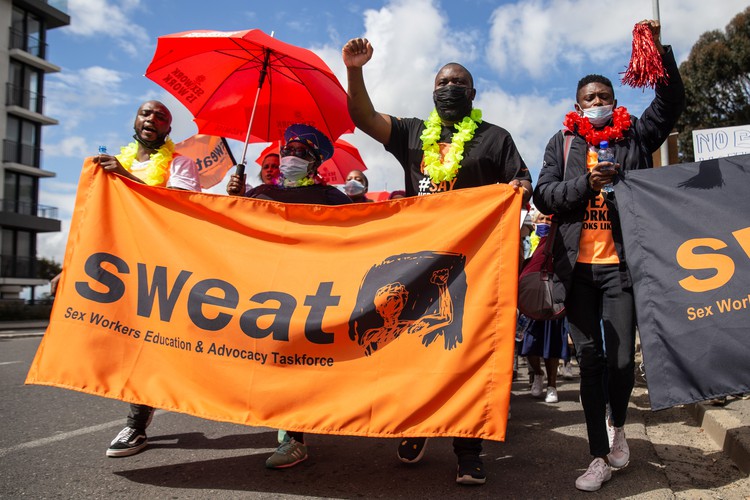
2 September 2025
A court challenge aimed at decriminalising sex work in South Africa is headed to a marathon trial after a court ruled this week that dozens of organisations could be joined as either respondents (opposing the application) or as friends of the court to give expert opinion. Archive photo: Ashraf Hendricks
A court challenge aimed at decriminalising sex work in South Africa is headed for a marathon trial after a court ruled this week that dozens of organisations could be joined as either respondents (opposing the application) or as amicus curiae (friends of the court) to give expert opinion.
The Sex Workers Education and Advocacy Taskforce (SWEAT), which initiated the litigation along with a sex worker, identified as SH, had urged Cape High Court Judge Andre Le Grange to limit the number of parties seeking to intervene in the matter. But he has ruled that they could all make submissions given the importance and interest in the matter.
It is now likely that the matter will only be heard next year.
The main respondents, the Minister and Director-General of Justice and Constitutional Development, have agreed to abide by the decision of the court.
According to SWEAT, the National Director of Public Prosecutions (NDPP) has issued a moratorium on the prosecution of sex workers until the matter is finally decided, which will almost inevitably end up in the Constitutional Court, which could take some years.
In the matter which came before Judge Le Grange this week, several organisations applied to be joined as respondents: Embrace Dignity, Sanctuary for Families, Equality Now, the Coalition Against Trafficking in Women, and Cause for Justice. They have been provisionally admitted. SWEAT did not oppose their applications as a “matter of convenience”, it said in feedback to interested parties.
The organisations in support of decriminalisation who have been allowed to intervene are: Sonke Gender Justice, Treatment Action Campaign, Human rights Watch, Amnesty International, UN Working Group on discrimination against Women and Girls, African Policing Civilian Oversight Group (APCOF), Centre for Human Rights (UP), the Dullah Omar Institute for Constitutional Law, Women’s Legal Centre, the Triangle Project, Gender Dynamix, South African Human Rights Commission, Socio-Economic Rights Institute of South Africa (SERI) and Access Chapter 2.
Judge Le Grange also ordered that the Survivor Exit Foundation and the UN Special Rapporteur on Violence and Discrimination against Women and Girls, both opposing the application, can make submissions as amicus curiae. SWEAT had opposed some of these applications on the grounds that the submissions were duplicated and would take the matter no further.
But while Judge Le Grange acknowledged some overlapping, he indicated that it was in the greater good to give all interested parties an opportunity to make submissions.
In a statement, SWEAT advocacy manager Duduzile Dlamini described the amicus hearings as a “crucial moment”.
“They bring the voices of experts and allies into the courtroom to demonstrate just how much harm these laws cause. For sex workers, this case is not abstract – it’s about dignity, safety and being able to live free from criminalisation,” she said.
SWEAT and SH argue that the laws that criminalise consenting adults for soliciting and engaging in sexual acts for reward, merely stigmatises what they do, makes them more vulnerable, and violates their rights.
They are seeking that certain sections of the Sexual Offences Act, the Criminal Law Amendment Act (Sexual Offences and Related Matters) and bylaws be scrapped.
They further seek an order against the NDPP withdrawing all charges and criminal proceedings brought in terms of these impugned provisions, release anyone serving sentences, and expunge criminal records.
In her affidavit, SWEAT director Emily Craven said SH and those supporting her wished to bring an end to the discrimination, harassment and lack of protection due to the criminalisation of their trade.
She said it was estimated in 2015 (the latest available research) that there were between 131,000 and 182,000 adult female sex workers in South Africa. This number did not account for adult male sex workers, or transgender or non-binary sex workers.
“Sex work forms part of the informal sector. It is an economic necessity for some. It is not the norm for them to have a pimp or to work in a brothel. The majority support between three and nine people.
“When comparing full-time sex workers income with data from Statistics South Africa on monthly earnings, sex workers are earning more than clerks, sales and services, crafts and related trades and up to six times more than domestic workers,” said Caven.
Craven said for laws to be rational and constitutional they must be underpinned by a rational government purpose, “otherwise they are arbitrary and violate the rule of law and the protection against arbitrary arrest and detention”.
SWEAT and SH argue there is no legitimate purpose underpinning the laws. In almost all instances, sex workers are arrested and or detained but not formally changed.
Craven said policy reasons for the criminalisation of sex work were outdated. Based on research and reasoning, they are no longer applicable.
“Upholding our constitutional challenge will not result in sex work being immediately available on any basis. For example, we do not in these proceedings challenge the provisions that criminalise the keeping or operation of a brothel.”
In 2022, a Bill to repeal the criminalisation had been published for comment. But it was later withdrawn and its fate is unclear.